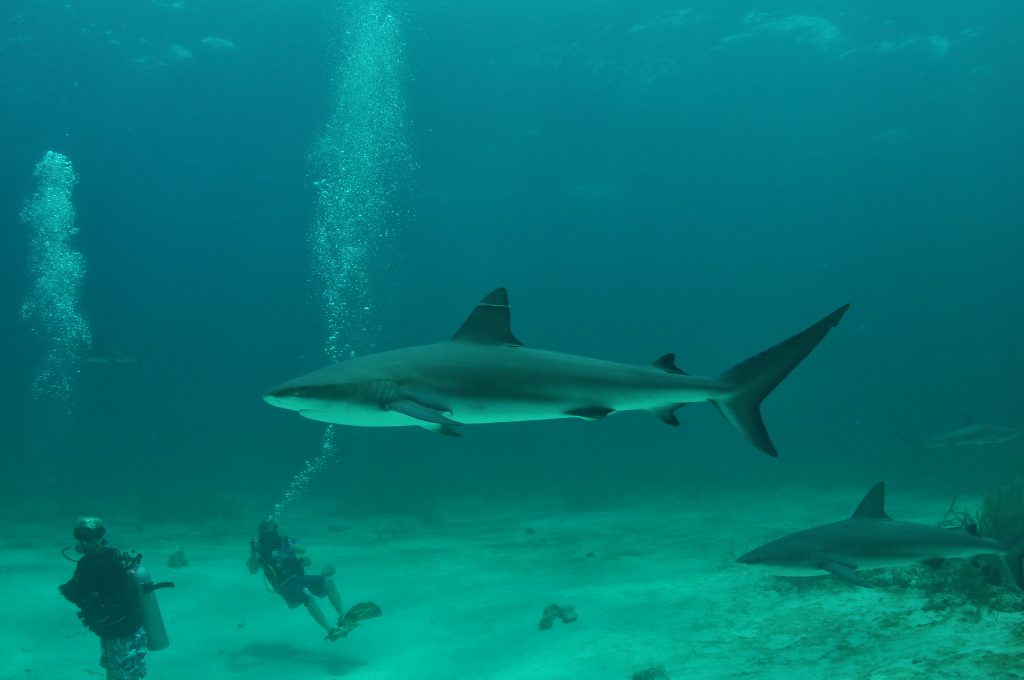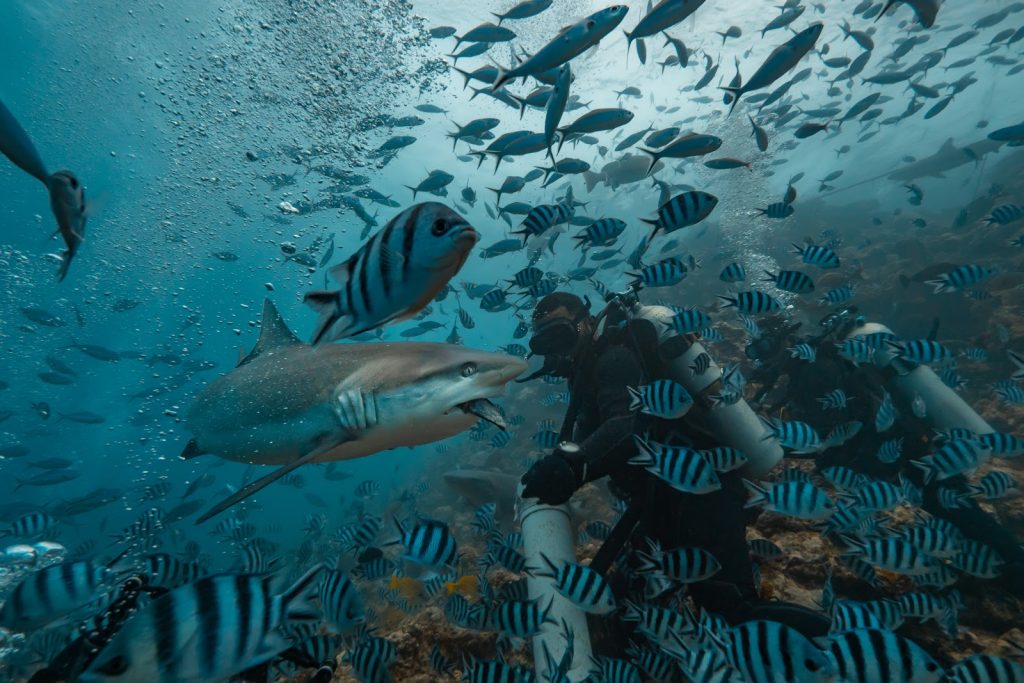Table of Contents
The Three Best Places to Dive Ethically with Sharks
This guest post comes to us from Casper Ohm, editor-in-chief at Water-Pollution.org.uk, who is writing to raise awareness of the alarming levels of water pollution in our planet’s oceans.
What is Ethical Shark Diving?
With the impacts of climate change being felt all over the world, the awareness of human impacts on our planet has grown rapidly. Ethical shark diving is a practical application of that awareness in order to reduce the harm human activity has on shark populations. Sharks have suffered a catastrophic decline in population over the past hundred years. While the vast majority of these deaths are the result of illegal fishing operations, humans impact shark populations in many different ways. From stormwater runoff, to plastics, and other pollutants to direct human interaction like scuba diving; we pose many challenges to shark populations and the marine ecosystem that depend on them. Though some human activities lie outside the realm of the individual’s control, the choice to physically go into the shark’s ecosystem behooves us to be aware of what impacts we will have on that ecosystem and act to mitigate them.

The Rules of Ethical Shark Diving
Scuba divers have been discussing best practices since John Smeaton developed the air pump. What has changed is the breadth and scope of our understanding of our actions. Calls for sustainable diving are already being widely discussed within the context of climate change. The same principle ought to be applied when planning a shark dive. Following these steps will help you reduce the harm you might cause, while promoting the right kind of change:
- Educate yourself on the impacts of diving on marine ecosystems.
There are plenty of case studies on the impacts divers have on the environment, and if you want to be ethical in your diving, you need to know your facts. Digital resources like Google Scholar have made it possible to find reliable sources on any subject, and so finding accurate information is just a few key-strokes away. - Choose your destination carefully.
As travelers, we are participating in a global industry that has far-reaching impacts. We bring economic growth to any place we visit, which makes governments look for ways to attract our business. When choosing a shark diving location, try to prioritize travel to jurisdictions where shark populations have been protected, and where those protections are being backed up with meaningful enforcement. Global citizens vote with our dollars, and governments are just as motivated by profit as any other organization. - Make sure your guide is ethical.
Shark diving is a major attraction for tourists in many communities around the world. How those businesses conduct business has a direct impact on marine ecology, and so as consumers of this service, it is our responsibility to shop responsibly. Make sure the company you have contracted to show you where to go is not overworking their staff, and are taking steps to reduce the ecological impacts of their business. Most ethical practices will have a statement on sustainability on their websites, and will ask their patrons to follow some common-sense rules as part of their company policy. Avoid carriers who overpack their boats, or try to avoid canceling trips due to inclement weather. Bonus points if the guide doesn’t use chum to attract sharks, as studies have shown this practice has consequences on shark behavior. Online reviews are your best friend here. - When it comes to plastic, pack it out even if you didn’t pack it in.
One of the greatest threats to sharks and their ecosystems are marine plastics. Any time we are in the water we have an opportunity to make a small impact by keeping an eye out for plastic debris. When it is safe to do so, we should make every effort to remove any such debris we see. While this problem is vast enough to require industrial-scale solutions, individual divers ought to still do our part.
- Watch out for illegal finning, and report it if you see it.
The leading cause of shark population decline today is illegal shark finning to fill the demand for shark fin soup. While most jurisdictions have outlawed the practice, global trade is still booming. Because of the criminal nature of these operations, it’s best to keep your distance. If you suspect you have witnessed a finning vessel, radio the appropriate authority, if any. Some marine authorities have more power and more presence than others. This is something you will have taken into account in rule one.
The Three Best Places to Dive Ethically with Sharks
Some of the best places to view sharks also happen to have the best conservation laws. To make planning your ethical diving trip easier, here are three of the best places to find ethical shark diving:
- Shark Reef Marine Reserve – Fiji
Fiji took steps to protect marine ecosystems back in 2004 by creating Shark Reef Marine Reserve. The holistic approach they took to marine conservation has resulted in an incredible rebound for the once-troubled coral reefs. In the close to twenty years since protecting the reserve, biodiversity is rapidly returning to the waters, meaning the ethical shark diver won’t have to try too hard to see a wide variety of shark species.
- Fakarava, Garuae Pass – French Polynesia
French Polynesia is one of the leading countries in implementing marine protections to help repopulate shark species. Added to this excellent local framework, Fakarava also has international protections brought by being declared a UNESCO biosphere. This beautiful reef hosts grey reef sharks and is enjoyable for any level of diver.
- Raja Ampat – Indonesia
Once on the verge of ecological collapse, Raja Ampat Marine Reserve is one of the greatest success stories conservationists have. The Indonesian government has taken every step to protect the ecosystem. This is a great place to go see a wide variety of shark species and marvel at the resiliency of the natural world. People being ethical in their engagements with nature has a real impact. Raja Ampat is the proof.
About the author: Casper Ohm is the editor-in-chief at Water-Pollution.org.uk, an outlet intended to raise awareness of the alarming levels of water pollution in our planet’s oceans. When he isn’t scuba diving and collecting data in the far corners of the world, he lives in New York with his family. Find him on Linkedin and Twitter: @casper_ohm




